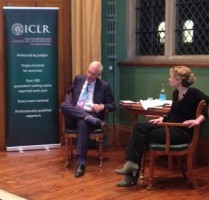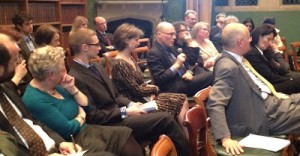ICLR Encounters: The Truth, The Whole Truth, or a Version of the Truth…
ICLR Encounters – a series of debates about issues affecting the law – kicked off last night with a fascinating encounter between Jon Snow, of Channel 4 News, and Elanor Dymott, law reporter turned novelist, at The Old Court Room in Lincoln’s Inn.
 The subject of discussion was ‘The Truth, The Whole Truth, or a Version of the Truth…’
The subject of discussion was ‘The Truth, The Whole Truth, or a Version of the Truth…’
Introducing this Encounter, Paul Magrath, ICLR’s Head of Development and Online Content, failed to stick to the following script:
Those of us who, like Jon Snow, work in journalism have a high regard for the truth. It may not be attainable, but it is something you should always strive for. A journalistic coup is a daring denouement: the truth is revealed, villains unmasked and heroes vindicated. The same could be said in the law, but perhaps with less conviction. Our system of justice is adversarial, which means that there are always at least two versions of the truth in play, a sort of jousting. Indeed, the earliest trials were trials by combat, not by truth. The truth in those days was assumed to lie with the strongest combatant. Now that our jousting is done in words, the truth is found to lie in the most persuasive combatant’s mouth.
Judges look for a version of the truth in deciding which of the adversaries has won. But any truth found is conditional on the facts and arguments presented to the court in support of the rival arguments.
A law reporter seeks a different kind of truth: not the facts but the law. The law reporter’s truth is a distillation or encapsulation of the law decided by the court. It is a version of the truth that is carried forward, by way of the system of precedent, into other cases, other arguments, other decisions, other reports.
The official Law Reports produced by ICLR carry with them the endorsement of being, in a judicial sense, the authorised version. They carry the weight of their authority, but one hopes they carry this weight, this learning, lightly enough to be portable. The truth should be an anchor, not a millstone.
The novelist’s truth is different again. I will let our resident novelist, Elanor Dymott, explain more about this. What her novel, Every Contact Leaves A Trace, shows is that we don’t always like the truth. If the truth offends, we tell white lies. We speak of the truth as being, in some cases, uncomfortable. There are truths which are said to be unwelcome.
 The hero of Elanor’s novel is someone for whom the truth is potentially not just unwelcome or uncomfortable, but positively devastating. It is the story of Alex, a lawyer, whose glamorous wife, Rachel, is murdered and who, in trying to find out who has done this and why, discovers all sorts of things about her past that he never knew or would have wanted to know. It shows how truth is linked to trust, how trust is dependent on truth. And it asks whether love can survive the truth.
The hero of Elanor’s novel is someone for whom the truth is potentially not just unwelcome or uncomfortable, but positively devastating. It is the story of Alex, a lawyer, whose glamorous wife, Rachel, is murdered and who, in trying to find out who has done this and why, discovers all sorts of things about her past that he never knew or would have wanted to know. It shows how truth is linked to trust, how trust is dependent on truth. And it asks whether love can survive the truth.
Jon began by commenting on a recent news assignment in which he found himself in Tahrir Square, Cairo, unable to speak a word of Arabic, trying to find out the truth about an alleged revolution in Egypt. He confessed that every journalist brings to the story their own prejudices and wondered how the same could not be true of lawyers and judges.
Elanor commented on the difference between working as a solicitor and as a law reporter, capturing the truth of legal argument while attempting (and failing) to filter out the human stories caught up in every court case. She went on to compare that with the very different approach to truth of novel writing.
The event was recorded and will be available soon as a video podcast, in which you will be able to follow the debate as it ranged far and wide and witness the engagement of the audience, many of whom asked questions afterwards.
After the event, copies of Elanor’s novel and of Jon Snow’s memoir, Shooting History, were available to purchase and for their authors to sign.
POSTSCRIPT
A writeup of this event was published in Counsel Magazine by Paul Marshall of 4-5 Gray’s Inn Square chambers, under the title Versions of Truth.
UPDATE: video now available.
Update: 29 April 2021. This post was amended slightly to update links and formatting.